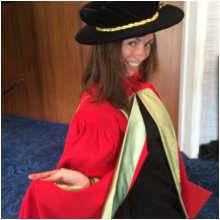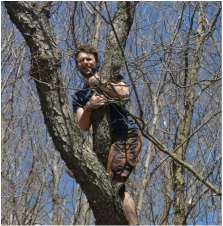Lab Members
Dr Jeanine Rhemtulla
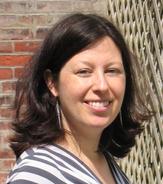
Assistant Professor
Dept. Forest & Conservation Sciences
University of British Columbia
Vancouver, Canada
jeanine.rhemtulla [at] ubc.ca
Dept. Forest & Conservation Sciences
University of British Columbia
Vancouver, Canada
jeanine.rhemtulla [at] ubc.ca
postdoctoral fellows
Dr. Laura Vang Rasmussen
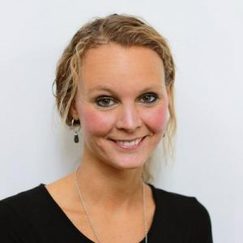
Banting Postdoctoral Fellow
laura.rasmussen [at] ubc.ca
Deforestation, agricultural intensification, and food security
laura.rasmussen [at] ubc.ca
Deforestation, agricultural intensification, and food security
doctoral Students
gabriela barragan
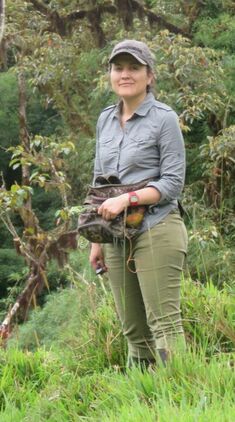
Ph.D. Candidate (2017 - present)
Planning the forest of the future
I am interested in planning and mapping forest restoration opportunities to build social and ecological resilience to climate change. I use a wide variety of methods, such as: expert interview, focus groups, community mapping, remote sensing, species distribution modelling, and optimization modelling. Through my research, I expect to support decision makers on achieving the restoration goals to obtain the desired benefits from the restored ecosystems and landscapes.
My research will take place in the highly biodiverse country of Ecuador, which has shown great political interest in implementing forest restoration projects in the last decade. This research will be made possible thanks to funding from the World Wildlife Fund (WWF) Russell E. Train Education for Nature Program and a UBC 4Y-Fellowship.
Throughout my career, I have noticed that one of the main factors that constraint stakeholders, who are Spanish speakers, to make informed decisions is their limited access to scientific literature. Scientific literature is commonly written in English and uses highly specialized terminology. I support decision makers who do not speak English by providing short summaries of scientific papers in Spanish through the project RESTAURA CONsCIENCIA www.restauraconsciencia.com] which I started in December 2019.
I also enjoy painting watercolors, specifically naturalistic illustrations [Instagram: @consciencia.arte]. I like hiking and dancing multiple rhythms.
Past Research Experience
I studied a major in Geography and Sustainable Development with a specialization in Land Use Planning at the Pontifical Catholic University of Ecuador (PUCE). I hold a master’s degree in Conservation Biology from PUCE and partnered with the NGO Conservation International. I hold a certificate in Ecological Restoration from the Institute of Ecology in Mexico and the International Foundation for Ecosystem Restoration. I have held several consultant positions for private and public entities. Email: dayana.barragan[at]ubc.ca/dgabarragan[at]gmail.com
Planning the forest of the future
I am interested in planning and mapping forest restoration opportunities to build social and ecological resilience to climate change. I use a wide variety of methods, such as: expert interview, focus groups, community mapping, remote sensing, species distribution modelling, and optimization modelling. Through my research, I expect to support decision makers on achieving the restoration goals to obtain the desired benefits from the restored ecosystems and landscapes.
My research will take place in the highly biodiverse country of Ecuador, which has shown great political interest in implementing forest restoration projects in the last decade. This research will be made possible thanks to funding from the World Wildlife Fund (WWF) Russell E. Train Education for Nature Program and a UBC 4Y-Fellowship.
Throughout my career, I have noticed that one of the main factors that constraint stakeholders, who are Spanish speakers, to make informed decisions is their limited access to scientific literature. Scientific literature is commonly written in English and uses highly specialized terminology. I support decision makers who do not speak English by providing short summaries of scientific papers in Spanish through the project RESTAURA CONsCIENCIA www.restauraconsciencia.com] which I started in December 2019.
I also enjoy painting watercolors, specifically naturalistic illustrations [Instagram: @consciencia.arte]. I like hiking and dancing multiple rhythms.
Past Research Experience
I studied a major in Geography and Sustainable Development with a specialization in Land Use Planning at the Pontifical Catholic University of Ecuador (PUCE). I hold a master’s degree in Conservation Biology from PUCE and partnered with the NGO Conservation International. I hold a certificate in Ecological Restoration from the Institute of Ecology in Mexico and the International Foundation for Ecosystem Restoration. I have held several consultant positions for private and public entities. Email: dayana.barragan[at]ubc.ca/dgabarragan[at]gmail.com
Hyeone Park
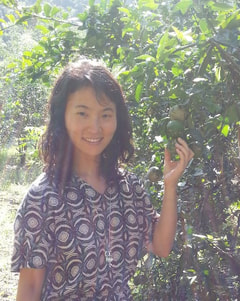
Ph.D. Candidate (2017 - present)
Urban Food Forests & Community Resilience
Urban food forestry is an emerging integrated approach to enhance the sustainability and resilience of urban communities and to improve the multifunctionality of urban landscapes in North America. However, it is “in its infancy” and lacks academic attention and systematic evaluation, which often leaves urban food forests subject to undervaluation, risk of dislocation, and/or lack of coherent land-use policy and planning. In response to this challenge, My PhD research is intended to assess comprehensive ecosystem services of urban food forests as a social-ecological system and to discuss what effects these food forests may have on community resilience in Vancouver.
Past research experience
My Master’s research at the University of Victoria, examined the potential of food forestry to assist in ecological restoration in North America. I developed a food forestry model to deepen our understanding of emerging food forestry and of its relationship to ecological restoration (published in Restoration Ecology, 2017). I also developed a Criteria and Indicators monitoring framework for food forestry embedded in the principles of ecological restoration (under review) in collaboration with the Galiano Conservancy Association in BC. The framework was adapted by the Conservancy to guide a monitoring program of their two food forest projects on Galiano Island. In my research, I conducted in-depth semi-structured interviews, a workshop, intensive content analysis with Atlas.ti (qualitative data analysis software), observation of and participation in several urban food forests in Canada, the United States and the United Kingdom, in conjunction with an extensive literature review on monitoring in the fields of ecological restoration, agroforestry, sustainable forest management and agriculture. My past research has left me fascinated with the intersection between food forestry and urban restoration, inspiring me to explore urban food forestry as an innovative way to enhance the resilience of urban communities.
Email: soph.park[at]yahoo.ca
Urban Food Forests & Community Resilience
Urban food forestry is an emerging integrated approach to enhance the sustainability and resilience of urban communities and to improve the multifunctionality of urban landscapes in North America. However, it is “in its infancy” and lacks academic attention and systematic evaluation, which often leaves urban food forests subject to undervaluation, risk of dislocation, and/or lack of coherent land-use policy and planning. In response to this challenge, My PhD research is intended to assess comprehensive ecosystem services of urban food forests as a social-ecological system and to discuss what effects these food forests may have on community resilience in Vancouver.
Past research experience
My Master’s research at the University of Victoria, examined the potential of food forestry to assist in ecological restoration in North America. I developed a food forestry model to deepen our understanding of emerging food forestry and of its relationship to ecological restoration (published in Restoration Ecology, 2017). I also developed a Criteria and Indicators monitoring framework for food forestry embedded in the principles of ecological restoration (under review) in collaboration with the Galiano Conservancy Association in BC. The framework was adapted by the Conservancy to guide a monitoring program of their two food forest projects on Galiano Island. In my research, I conducted in-depth semi-structured interviews, a workshop, intensive content analysis with Atlas.ti (qualitative data analysis software), observation of and participation in several urban food forests in Canada, the United States and the United Kingdom, in conjunction with an extensive literature review on monitoring in the fields of ecological restoration, agroforestry, sustainable forest management and agriculture. My past research has left me fascinated with the intersection between food forestry and urban restoration, inspiring me to explore urban food forestry as an innovative way to enhance the resilience of urban communities.
Email: soph.park[at]yahoo.ca
Ira Sutherland
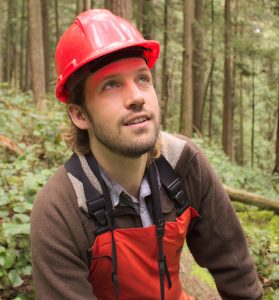
Ph.D. Candidate (2018 - present)
Spatial and temporal dynamics of ecosystem services in British Columbia
I am interested in how ecosystem services are changing, what drives their changes, and how we can better address complex temporal processes of change in natural resource management. In my PhD I am compiling a spatial temporal database of multiple ecosystem services, such as salmon, timber, agriculture, and carbon storage, and their drivers at the scale of all BC roughly 1920-present. I will analyze these data using time series models to understand their trends; cluster analysis to identify their co-occurrence in space; and regression models to identify what drives their changes. My research approach leverages existing historical data (often from Government databases/archival records) and emerging methods in spatial data analysis with the aim to provide a quantitative spatial history of the province, focusing on critical ecosystem services, such as salmon, timber, agriculture, and carbon storage, and their changes through time.
For more info, check out these links to my publications, professional credentials, filmmaking, and international travel. In my spare time I’m often found exploring for the biggest trees, bike packing, and tasting brews at the local microbrewery. Follow along at @ira_sutherland (Twitter); @vanbigtrees (instagram)
Email: ira.sutherland[at]ubc.ca
Spatial and temporal dynamics of ecosystem services in British Columbia
I am interested in how ecosystem services are changing, what drives their changes, and how we can better address complex temporal processes of change in natural resource management. In my PhD I am compiling a spatial temporal database of multiple ecosystem services, such as salmon, timber, agriculture, and carbon storage, and their drivers at the scale of all BC roughly 1920-present. I will analyze these data using time series models to understand their trends; cluster analysis to identify their co-occurrence in space; and regression models to identify what drives their changes. My research approach leverages existing historical data (often from Government databases/archival records) and emerging methods in spatial data analysis with the aim to provide a quantitative spatial history of the province, focusing on critical ecosystem services, such as salmon, timber, agriculture, and carbon storage, and their changes through time.
For more info, check out these links to my publications, professional credentials, filmmaking, and international travel. In my spare time I’m often found exploring for the biggest trees, bike packing, and tasting brews at the local microbrewery. Follow along at @ira_sutherland (Twitter); @vanbigtrees (instagram)
Email: ira.sutherland[at]ubc.ca
Pablo Gonzalez Moctezuma
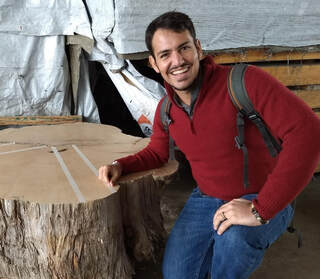
Ph.D. Student (2019 - Present)
As a multidisciplinary researcher my interests range from the abstract knowledge and methods of complexity science, systems thinking, and mathematical models to the particularities of functional ecology, agroecology and rural development. During my PhD I will be exploring who are the actors doing restoration in Latin America and what are their respective drivers. My fieldwork will take part in Southern Coastal Mexico. Using agroforestry plots that are being deployed as a part of the national policy Sembrando Vida, I want to explore smallholder farmers’ perceptions on restoration and systematize the way they make their decisions on the design and management of their plots. I want to understand if functional diversity is related to the success of restoration initiatives and examine the factors that allow a small farmer to become an agent of restoration.
In my free time you can find me fishing, especially if salmon are running, walking around the forest or learning how to sail. Do not hesitate in contacting me: pabloglz [at] ubc.mail.ca
As a multidisciplinary researcher my interests range from the abstract knowledge and methods of complexity science, systems thinking, and mathematical models to the particularities of functional ecology, agroecology and rural development. During my PhD I will be exploring who are the actors doing restoration in Latin America and what are their respective drivers. My fieldwork will take part in Southern Coastal Mexico. Using agroforestry plots that are being deployed as a part of the national policy Sembrando Vida, I want to explore smallholder farmers’ perceptions on restoration and systematize the way they make their decisions on the design and management of their plots. I want to understand if functional diversity is related to the success of restoration initiatives and examine the factors that allow a small farmer to become an agent of restoration.
In my free time you can find me fishing, especially if salmon are running, walking around the forest or learning how to sail. Do not hesitate in contacting me: pabloglz [at] ubc.mail.ca
MASTERS students
Emily Doyle-Yamaguchi
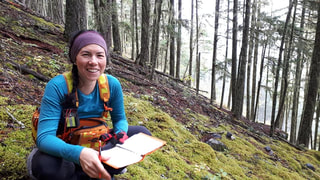
(M.Sc. Student (2018 - present), Forester-in-Training
Pine mushrooms are among several wild mushroom species that form part of the traditional diet of Indigenous peoples in British Columbia, as well as generate significant economic benefits as non-timber forest products. As a mycorrhizal species that relies on a live tree host, however, Tricholoma murrillianum (pine mushroom) is at odds with timber harvesting—giving rise to conflicts over forest management. Increasing recognition of Indigenous rights to self-determination, including the stewardship of their land, means that this is not simply a matter of mushrooms versus timber, but of who gets to decide. Spatially explicit tools such as landscape models can provide the information to support these big-picture conversations, as well as practical decision-making. Predictive Ecological Modeling is one approach, but is reported to lack the precision needed for mapping pine mushroom habitat in particular (Ehlers et al 2007). Further, conventional ecological modeling is also not known to incorporate the complex interactions and fine-scale data held within traditional ecological knowledge.
In collaboration with the Lil’wat Nation, I will explore the use of both conventional and traditional ecological knowledges to predict the distribution of pine mushroom habitat on Lil’wat Traditional Territory. Through my research process and the products generated, I hope to further the recognition of Indigenous ways of knowing, food sovereignty, and rights to their land and culture. Both qualitative and quantitative data will inform my research, and be collected, analyzed and reported on in accordance with the S7istken Lil’wat Research Protocol.
I am grateful to Dr. Jeanine Rhemtulla and Dr. Janette Bulkan for their supervisory guidance, Ms. Tonya Smith for introducing me to the Lil’wat community, and Mr. Jordon Gabriel for his involvement as a driving force and technical advisor for this project.
References
Ehlers, T., Fredrickson, S., & Berch, S. M. (2007). Pine mushroom habitat characteristics and management strategies in the West Kootenay region of British Columbia. B.C. Journal of Ecosystems and Management, 8(3), 76–88.
Email: emily.doyle-yamaguchi[at]ubc.ca
Pine mushrooms are among several wild mushroom species that form part of the traditional diet of Indigenous peoples in British Columbia, as well as generate significant economic benefits as non-timber forest products. As a mycorrhizal species that relies on a live tree host, however, Tricholoma murrillianum (pine mushroom) is at odds with timber harvesting—giving rise to conflicts over forest management. Increasing recognition of Indigenous rights to self-determination, including the stewardship of their land, means that this is not simply a matter of mushrooms versus timber, but of who gets to decide. Spatially explicit tools such as landscape models can provide the information to support these big-picture conversations, as well as practical decision-making. Predictive Ecological Modeling is one approach, but is reported to lack the precision needed for mapping pine mushroom habitat in particular (Ehlers et al 2007). Further, conventional ecological modeling is also not known to incorporate the complex interactions and fine-scale data held within traditional ecological knowledge.
In collaboration with the Lil’wat Nation, I will explore the use of both conventional and traditional ecological knowledges to predict the distribution of pine mushroom habitat on Lil’wat Traditional Territory. Through my research process and the products generated, I hope to further the recognition of Indigenous ways of knowing, food sovereignty, and rights to their land and culture. Both qualitative and quantitative data will inform my research, and be collected, analyzed and reported on in accordance with the S7istken Lil’wat Research Protocol.
I am grateful to Dr. Jeanine Rhemtulla and Dr. Janette Bulkan for their supervisory guidance, Ms. Tonya Smith for introducing me to the Lil’wat community, and Mr. Jordon Gabriel for his involvement as a driving force and technical advisor for this project.
References
Ehlers, T., Fredrickson, S., & Berch, S. M. (2007). Pine mushroom habitat characteristics and management strategies in the West Kootenay region of British Columbia. B.C. Journal of Ecosystems and Management, 8(3), 76–88.
Email: emily.doyle-yamaguchi[at]ubc.ca
Marcos Kavlin Castaneda
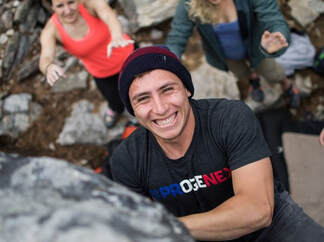
M.Sc. Student (2019 - present)
I am interested in the many forms of ecological restoration, and in particular large-scale restoration across landscapes. Having briefly worked in sustainable development projects, wildfire research, and the forestry industry, I have become greatly interested by the impact the decisions we make as communities can have on the landscape around us.
My research aims to observe the trends in forest regrowth patches through time and determine what socio-economic (as well as biotic and other abiotic) drivers best explain each trend. My study sites include two watersheds, one in Ecuador, the other in Bolivia, thus allowing a comparison between the two different approaches these countries have to restoration. This research will be conducted primarily through remote sensing techniques such as Google Earth Engine, and the driver analysis will be conducted using R or Python.
As we seek to scale up restoration efforts in a bid to mitigate climate change, it becomes ever more important to understand restoration across landscapes and the underlying dynamics. Hopefully, this research will help us better understand these dynamics and inform current, as well as future, large-scale restoration initiatives.
My hobbies include bouldering (climbing), playing soccer, and generally being active outdoors. I also love watching a good movie!
email: kavlinmarcos[at]gmail.com
I am interested in the many forms of ecological restoration, and in particular large-scale restoration across landscapes. Having briefly worked in sustainable development projects, wildfire research, and the forestry industry, I have become greatly interested by the impact the decisions we make as communities can have on the landscape around us.
My research aims to observe the trends in forest regrowth patches through time and determine what socio-economic (as well as biotic and other abiotic) drivers best explain each trend. My study sites include two watersheds, one in Ecuador, the other in Bolivia, thus allowing a comparison between the two different approaches these countries have to restoration. This research will be conducted primarily through remote sensing techniques such as Google Earth Engine, and the driver analysis will be conducted using R or Python.
As we seek to scale up restoration efforts in a bid to mitigate climate change, it becomes ever more important to understand restoration across landscapes and the underlying dynamics. Hopefully, this research will help us better understand these dynamics and inform current, as well as future, large-scale restoration initiatives.
My hobbies include bouldering (climbing), playing soccer, and generally being active outdoors. I also love watching a good movie!
email: kavlinmarcos[at]gmail.com
Juliana Kaufmanis
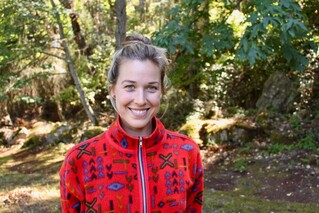
M.Sc. Student (2019-present)
I am interested in ecological restoration and the myriad of forms that restoration can take. Coming from past research experiences in freshwater and riparian ecology, as well as a growing season farming and learning at the UBC Farm Centre for Sustainable Food Systems, I have a deep interest in how land uses and social processes interact as part of a larger, mosaiced system. I propose to study the research-implementation gap of forest landscape restoration (FLR) in the literature by comparing the conceptual discourse with any reports of its implementation worldwide. As we enter the “decade of ecological restoration”, the outcomes of restoration efforts are at the front of the global conscience. I hope that my findings contribute to the global conversation centering on landscape-scale restoration and the integration of theoretical and practical approaches of FLR.
In my spare time I am often drawing, and if it’s the summertime playing beach volleyball.
I am interested in ecological restoration and the myriad of forms that restoration can take. Coming from past research experiences in freshwater and riparian ecology, as well as a growing season farming and learning at the UBC Farm Centre for Sustainable Food Systems, I have a deep interest in how land uses and social processes interact as part of a larger, mosaiced system. I propose to study the research-implementation gap of forest landscape restoration (FLR) in the literature by comparing the conceptual discourse with any reports of its implementation worldwide. As we enter the “decade of ecological restoration”, the outcomes of restoration efforts are at the front of the global conscience. I hope that my findings contribute to the global conversation centering on landscape-scale restoration and the integration of theoretical and practical approaches of FLR.
In my spare time I am often drawing, and if it’s the summertime playing beach volleyball.
Undergraduate Students
alumni
|
POSTDOCTORAL STUDENTS
Delphine Renard, Ph.D. (2015) GRADUATE STUDENTS Tara Bergeson, Ph.D. (Year) Lauren Nerfa, M.Sc. (Year) Libin T.L., M.Sc. (Year) Emily Clark, M.Sc. (2016) Theraesa Coyle, M.Sc. (2016) Thomas Fox, M.Sc. (2015) Sylvia Wood, Ph.D (2014) Martine Larouche, M.Sc. (2013) UNDERGRADUATE STUDENTS Riley Finn (Year) Jennifer Norihiro (Year) Caitlin Laidlaw (2017) Queen Elizabeth Fellow Hannah Crisp (2016) Queen Elizabeth Fellow Jane Chow (2015) Gervais Lee (2014) UBC USRA Bronwen Tucker (2014) David Chen (2014) Cory Lesk (2013) NSERC USRA Matthew Park (2012) Melissa Ward (2011) Lesley Winterhalt (2009) |
